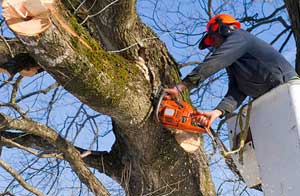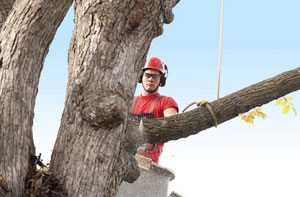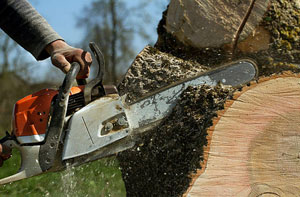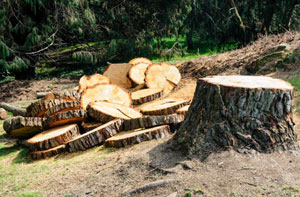Exeter Tree Surgeons (EX1) Devon: Trees are an attractive feature of many gardens and properties in Exeter, and they will often transform an otherwise two dimensional area by adding structure, substance and style. However, when trees are poorly maintained or are impacted by damaging weather conditions like flooding or gales, issues can occur. Before any work commences, the best option is to get advice from a professional tree surgeon in Exeter, when your trees are in need of attention.
Those who employ an unqualified operative, or attempt to do tree work by themselves, may risk damaging property, trees or even life. However, tree work is not a safe occupation, even for trained tree surgeons, who know about all the hazards. Within the industry there are a startling average of 140 major injuries and 3 deaths annually, making it one of the most hazardous jobs in Britain.

With falling trees and branches causing around five fatalities annually in Britain, a threat to life can even be posed by a poorly maintained or damaged tree. If you bring in someone to carry out tree work and an injury occurs, or property is damaged, you could be liable to third-party compensation claims due to the consequences of your actions. This is why using a professional Exeter tree surgeon to undertake the work on your trees is very important. (The source of the above figures was HSE).
There are 2 major industry bodies, one or both of which a qualified Exeter tree surgeon should be an approved member of. The professional standing and membership of any tree surgeon in Exeter can be checked on the websites of both the Arboricultural Association (AA) and the International Society of Arboriculture (ISA). To discover whether any specific local tree surgeon has Approved ARB Contractor status and has membership of either of these 2 organisations, you can check this website.
If an issue springs up during the course of the work, or after it has been completed you are able to contact these industry bodies for assistance in arbitration and for help and advice.

If someone offers you a quotation for any tree work and they're not on this directory, you should courteously decline their offer of work and find an approved contractor. Once their professional accreditations and memberships have been thoroughly checked, you should try to get a minimum of 3 estimates from different companies in Exeter. Due to the risks involved in the work, you should ask the questions below, stating you need them to provide the answers:
- How much insurance cover do you provide? You shouldn't consider a tree surgeon in Exeter with any less than five million pounds public liability insurance as set out by the ISA and AA.
- Can you provide me with a written quotation? You should NEVER accept a verbal quote only. Only ever accept a written quote.
- Can I contact a recent person you've worked for so I can check the standard of your workmanship? It's advisable to perform an independent examination of any recent work.
- Have you got a NPTC certificate for chainsaw use, and documentary proof of your qualifications and professional memberships? Any tree worker using a chainsaw, must by law have NPTC/LANTRA certification. Qualifications may include Certificates and National Diplomas in Arboriculture.
The written quotation that you're provided with should include clear and precise details about the planned work. It should mention whose responsibility it is to remove waste, tree branches and stumps, and should also include specifics of any trees which could be protected, and the steps needed to obtain permission to carry out work on them. You should also make sure that VAT is included on the quotation. Understanding that you've got a responsibility for employing only qualified tradespeople to work on your trees and property, is crucial. This is laid out by the "Common law duty of care responsibilities and sometimes liabilities under the Occupier's Liability Acts of 1957 and 1984."
PRIOR TO WORK COMMENCING - Your selected Exeter tree surgeon will need to make enquiries into the possibility of any trees being protected in your area and take the necessary steps to make sure that any tree work can be given the go-ahead from the local authorities. Even protected trees need maintenance in order to cut back dead or damaged wood and ensure the safety of the public, so discovering that a tree has protected status doesn't mean that work can't be carried out.
At least 6 weeks written notice is required to the Local Planning Authority before any tree work can be performed, if your property in Exeter is in a conservation area. This written notice is not required if the tree stem is under 75 millimetres in diameter when measured at 1.5 metres from ground level. If the thinning or pruning of a protected tree's branches are required to promote and sustain growth, written notice is also not necessary.

On site they will carry out a complete assessment of your trees and determine the required remedial treatment and how best and safely to achieve the required outcome. Where there's any potential for falling debris and branches, a full risk assessment will have to be undertaken on public spaces, your property, and sections of a neighbour's property that could be affected. At this point, the level of protection needed and the number of operatives required will also be established. This is both PPE (personal protective equipment) and other safety precautions to keep property and the general public safe from harm or damage.
ON THE DAY OF WORK - Barriers and safety measures should be put in place before any tree felling, climbing or cutting of branches commences, to keep passers-by and unauthorised persons away from the area of work. When there is the possibility of debris crashing onto a public highway, it might be necessary to briefly halt the traffic.
Subject to the type of work required a tree surgeon will need varying degrees of protection. When doing basic work with a chainsaw, to prevent cutting injuries to the hands, torso and legs, they will at the very least be wearing protective clothing. Every operative involved in the work, must at all times be wearing eye and head protection, and high visibility clothing.
Climbing equipment and ladders will be required if any working at height is involved, and to help with the removal of high branches and large sections of tree trunk, extra personnel will be essential. It's advisable to inform your neighbours of the need for access, since a skip or other means of transporting the waste away will be stationed as close to the work area as possible.
AFTER COMPLETION OF WORK - All of the waste and branches will be hauled away and the whole site cleared of any debris, after all work has been completed. Your tree surgeon will then put together and sign off a certificate of work done, a copy of which will be presented to you. This is particularly important where trees with TPOs are involved. Any safety measures that were put in public spaces can then be removed, with highways and paths being re-opened to the public.
If you've got any complaints about or issues with the work, you should get them fixed straight away by firstly taking them up with the tree surgeon. If your tree surgeon is a registered member of a professional trade association, you can receive help and advice from the International Society of Arboriculture or the Arboricultural Association in order to come to an acceptable conclusion, if there is any further dispute.
Tree Removal Exeter
Sometimes, tree removal is a necessary job when a tree is unsafe, suffers from disease, or outgrows its position. Trees are undeniably important to our environment, but at times, they can create risks for nearby properties or even individuals. Factors like overhanging branches, damaged roots, or the risk of a tree falling can make removal the safest course of action. It's certainly not a choice to be made without thought, but when the situation calls for it, it can enhance the safety and usability of your outdoor space in Exeter, offering you more peace of mind.

Removing a tree is not as straightforward as it seems, particularly for bigger trees. It requires careful planning and the right equipment to ensure it's done safely and efficiently. Professional tree surgeons know how to assess the tree and determine the best way to remove it with minimal disruption to the surrounding area. They'll also take care of the tree disposal, saving you the trouble. Trying to remove a tree yourself can be risky, so hiring an expert is always the best option for complex or large-scale tasks.
After a tree has been taken down, it can create new opportunities for your outdoor space. The additional sunlight can help nearby plants thrive, and the newly available area can be put to good use, perhaps as a patio, a driveway, or even a garden feature. Whether you're removing a tree for safety reasons or to enhance the layout of your garden, doing so carefully can truly transform your outdoor area in Exeter, making it more enjoyable for many years ahead. (Tags: Tree Removal Exeter).
Air-Spading Exeter
When you're worried about the overall health of a tree, it may be due to various factors, but problems with the root system is a commonplace cause of such concerns. So as to check for root rot, soil compaction, or other issues, a certified tree surgeon in Exeter might need to access the root system of your tree.
Because there is a chance of causing damage to the roots during the process of digging, in the past this was a tricky thing to achieve. Many modern day tree surgeons in Exeter use a technique called "air spading", which uses compressed air to effectively break up and remove compressed soil without any risk of damaging the tree's roots, or any buried utilities that happen to be nearby.
The general health of a tree can be negatively affected when the soil around the roots becomes compacted by heavy foot traffic, building work or passing vehicles. Because of a lack of water and nutrients, a tree can become "stressed", rendering it more susceptible to attack by pests, disease and insects. Air spading is also useful to resolve root flare problems, where the flare around the base of the tree becomes covered with too much soil, causing the tissue to break down, and increasing the possibility of root rot.
Blowing air into the soil at speeds of up to 1200mph, the air-spading process necessitates the use of an air-spade and an air compressor which forces air into voids in the soil, causing it to break down rapidly, but not damaging harming the tree roots or nearby utilities. As the soil is directed away from the tree's roots by the powerful flow of air, immediate inspection can take place. Problems can then be rectified and the soil exchanged for a looser layer of wood mulch and fertiliser to rejuvenate the tree.
Leylandii Hedge Removal Exeter
Leylandii hedges are a top pick for property owners in Exeter who value both fast growth and privacy. Nonetheless, they have the tendency to grow out of control and become hard to keep in check. Before removing a Leylandii hedge, it is crucial to think about a few critical factors. First, it's important to ensure that the hedge isn't protected by a Tree Preservation Order or other legal designation. If it is, you'll need to obtain permission from the local council before removing it. Furthermore, Leylandii hedges can have complex root networks, underscoring the importance of employing a skilled tree surgeon to safely remove the hedge and its roots. Finally, once the hedge is removed, you'll need to dispose of the waste responsibly. To sum up, removing a Leylandii hedge can be a hazardous and lengthy process, requiring the implementation of adequate safety precautions and possibly consulting with an expert.
Deadwooding Exeter
All professional tree surgeons in Exeter will carry out the procedure known as dead-wooding (or deadwooding), which is an important element of tree management. Dead-wooding calls for the careful removal of dying and dead branches that could pose a threat to passers-by, vehicles or buildings. The most widespread reasons for tree branches dying off are heavy shading, root damage, attack by pests or diseases, and this is in fact a purely natural process.
Whilst the most frequent motive for removing dead branches is one of safety, it's also often done to benefit the tree, and for aesthetic reasons. A tree that has an excessive amount of damaged, dying and dead branches is prone to insect infestations and the spread of disease, so you can greatly improve a tree's health by removing these offending branches. Trees that have lots of dead wood also look unappealing, therefore to improve its appearance, this should all be removed.
Only larger and more substantial dead branches will typically be cut off, because in most situations the small ones won't pose much of a risk. Having said that, where trees are overhanging a public area, a park, a dwelling, a garden or a highway in Exeter, it may be necessary to remove any dead wood that's in excess of fifty millimetres in diameter.
Tree Cable Bracing Exeter
Cable bracing is a method that's used to offer support to a tree when it is showing signs of decay, damage, or is a risk to surrounding property (or persons). When highly valued or older trees in Exeter are concerned, cable bracing is generally used where it is unsatisfactory to chop down a tree or cut out large portions that are unsafe or unstable.
Fitting a cable bracing setup might be an option to add support to the weak limbs, poor joints and V-shaped forks of a tree. Carrying out various forms of bracing work, an experienced tree care specialist should be able to use rods and cables to help alleviate structural stress, and hopefully extend the life of veteran trees in Exeter.
Cable bracing has the objective of offering a shock-absorbing and flexible means of support that's non-invasive and doesn't cause additional damage to the tree by having to drill and bolt the branches. Before any actual work can proceed, a comprehensive risk risk assessment must be carried out to ensure the safety of the tree and encircling areas. (Tags: Cable Bracing Exeter, Cable Bracing Trees Exeter, Tree Cable Bracing Exeter, Cable Bracing Methods Exeter).
The International Society of Arboriculture (ISA)
The International Society of Arboriculture (ISA) is a non-profit, international organisation that is based in Atlanta, United States, it fosters the benefits and awareness of trees. Providing credentials for tree care professionals all around the globe, the ISA is a membership association that nurtures the professional practice of arboriculture.
Encouraging best tree care practices via educational publications, events and services, the ISA has a solid focus on enabling those in the tree care sector develop their knowledge, arboricultural expertise and skills whenever possible.
During mid-2016 the United Kingdom's Arboricultural Association (AA) became an associate organisation of the International Society of Arboriculture after signing a partnership agreement with them. Offering further opportunities for ISA members in Great Britain and Ireland, this also strengthened the relationship between the two associations. UK tree care professionals having either AA or ISA membership are now in a position to reap the wide and varied benefits of being part of an international network. With associate organisations and professional affiliates in South Africa, Asia, Australia, Europe, New Zealand, and the UK, the International Society of Arboriculture now boasts over 22,000 members globally.
Ash Dieback
A deadly fungal disease of ash trees that was first documented in the British Isles in 2012, ash dieback (Hymenoscyphus fraxineus) is likely to decimate about 80 percent of the current ash trees. Following the Dutch Elm Disease catastrophe, which killed the UK's elm trees, ash dieback is going to have an enormous impact on our beloved countryside.
Ash dieback has an especially disastrous effect on the native British common ash (Fraxinus excelsior), although it affects the entire Fraxinus genus of trees, which have varying levels of tolerance. Originating in eastern Asia where the native Manchurian ash (Fraxinus mandshurica) and Chinese ash (Fraxinus chinensis) are less susceptible to it, the fungus which causes ash dieback is called Hymenoscyphus fraxineus (H. fraxineus), and it kills off a tree by obstructing its vascular (water transport) systems.
Dispersed by microscopic spores that blow on the wind, released from the fruiting bodies of the fungus, and can travel for many miles, ash dieback has already spread to most regions of Great Britain.
The conspicuous symptoms of ash dieback are:
- Foliage that wilts, turns black in colour and falls prematurely.
- Dark brown necrotic lesions form where limbs join the trunk.
- Dying leaves and shoots which are visible during the summertime.
- Dark patches on leaves during mid to late summer.
- New epicormic growth appearing from previously dormant buds (common in trees under stress).
Sometimes ash trees have the tenacity to repel early infections, but as the disease returns year-on-year, they ultimately perish. There's currently no remedy for chalara ash dieback, and no apparent method for stopping its spread.
If you think that you have identified a tree suffering from ash dieback in your garden in Exeter, or in the neighbourhood, you could report it to the Forestry Commission's "Tree Alert Service", although chalara ash dieback is so widespread all over Britain that they're really only interested in cases found in areas not previously affected. You can still however get in touch with a local tree surgeon, who can offer guidance on how best to proceed.
Trees affected - the genus Fraxinus.
Accidents Through Tree Surgery
The work undertaken by tree surgeons in Exeter can be very hazardous. Tree work involves a risk of injuries to both operatives, co-workers and passers-by, therefore all reasonable precautions must be taken when carrying out work on trees.
It would seem (as reported by the HSE (Health and Safety Executive)), that falls from trees, the use of chainsaws, and being struck by a falling branch or tree are responsible for a large majority of major and fatal injuries that are linked to tree work. In fact, those people involved in tree care have a higher likelihood of injuring themselves seriously than those in the construction sector.
The most common tree care accidents when it comes to insurance claims, involve being struck by objects (ropes, branches, trees, grapple hooks, cranes etc), slipping from ladders and lifting injuries.
This will all help you understand why it's so important to hire an experienced tree surgeon in Exeter. Most often, accidents that occur in the tree care industry are due to untrained operatives taking on work that they're not equipped for, or skilled in. So, using an experienced and trustworthy Exeter company that has been working in the local area for several years, is the simplest way to sidestep such issues.
Emergency Call-Outs Exeter
Having to make an emergency call to a tree surgeon is not an occurrence that is likely to arise all that often, however if you have sizeable trees growing in your Exeter garden, this may be a necessity sooner or later. When the conditions in Exeter are stormy and windy, tree surgeons expect to see a rise in emergency calls, and thankfully many of them provide a 24/7 service for your peace of mind. The likelihood of injury or damage is higher during gusty weather, with branches snapping off and plummeting to the ground below, and sometimes even whole trees collapsing. Common issues that happen due to tree emergencies are damaged fences, busted garden furniture, cracked greenhouses and squashed sheds.
When substantial tree branches break of and fall onto highways, railway lines and public pavements, the local authorities in Exeter will also sometimes need emergency tree surgeons.
When a tree has lost some of it's larger branches it could become lopsided or uneven, with more branches and weight on one side than the other. This can be both unsafe and unsightly, so the tree may have to undergo "rebalancing". To handle all of these various problems, you should contact a local Exeter tree surgeon who offers emergency services.
Eco-Plugging Exeter
Stump grinding is the traditional strategy employed by most Exeter tree surgeons for removing large stumps. There is however a cheaper alternative to this approach nowadays, which is known as "eco-plugging", and this is growing in popularity. Not only is this option less expensive, but it can also be employed where there are stump grinding accessibility problems, in hard-to-reach and awkward places.
For killing off tree stumps without affecting the surrounding trees and vegetation, eco-plugging is a highly effective treatment. Eco-plugs can be put to use at any time of the year and in any weather, and they kill off the entire root system of the tree stump. Effective for treating a wide array of trees, eco-plugs are 95-100 percent effective and contain a form of granular glyphosate herbicide. (Tags: Eco-Plugging Tree Stump Removal Exeter, Eco-Plug Treatments Exeter, Eco-Plugs Exeter, Eco-Plugging Exeter).
Tree Surgery Tasks Exeter

Exeter tree surgeons can normally help you with crown lifting, cut sealing, vegetation management, tree transplanting, hedge lowering in Exeter, woodland clearances, stump treatment in Exeter, tree care, tree planning, cable bracing, tree shaping in Exeter, tree fertilising, root pruning Exeter, root removal, root grinding, formative pruning, repair of storm damaged trees, landscaping, tree watering, tree surveys Exeter, landscape clearance, woodland management in Exeter, tree reduction, emergency tree surgery Exeter, tree dismantling Exeter, tree felling, hedge trimming, safety inspections Exeter, root flare exposure, coppicing, tree work, crown removal, damage restoration in Exeter, tree pest control, crown thinning and other tree surgeon services in Exeter, Devon. Listed are just a handful of the tasks that are performed by tree surgeons. Exeter providers will be happy to tell you about their whole range of services.
Tree Surgeons Near Exeter
Also find: Birchy Barton tree surgeons, Heavitree tree surgeons, Pocombe Bridge tree surgeons, Poltimore tree surgeons, Alphington tree surgeons, Whitestone tree surgeons, Longdown tree surgeons, Ide tree surgeons, Marsh Barton tree surgeons, Cowley tree surgeons, Exminster tree surgeons, Stoke Hill tree surgeons, Nadderwater tree surgeons, St Thomas tree surgeons, Exwick tree surgeons, Whipton tree surgeons, Wonford tree surgeons and more. Most of these towns and villages are covered by local tree surgeons. Local homeowners and others can obtain quotations by clicking here.
(Created with tree surgeons Exeter text version four.)
More: Hedge Reduction, Cable Bracing, Woodland Management, Tree Replanting, Tree Bracing, Crown Reduction, Tree Surveys, Site Clearance, Stump Removal, Tree Planning, Eco-Plugging, Wood Chipping, Tree Watering, Crown Reduction, Tree Management, Stump Removal, Tree Pollarding, Forestry Management, Tree Planting, Vegetation Management, Crown Removal, Tree Cutting, Crown Thinning, Shrub Maintenance, Tree Inspections, Crown Lifting, Crown Reduction, Hedge Planting, Tree Topping, Crown Reduction.
Tree Surgeons Near Me - Crown Thinning Exeter - Tree Surgeon Exeter - Tree Management Exeter - Stump Grinding Exeter - Tree Care Exeter - Tree Surgeons Exeter - Tree Surgery Exeter - Woodland Management Exeter




